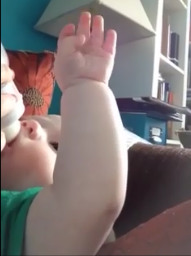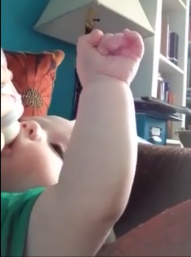This week and next I am taking a course to become an assistant in my sister’s infant and toddler classrooms. After 5+ years studying child developmental psychology, a lifetime around children, and a year and a half as a parent I can’t say I went into this class without preconceived notions of how and what to teach a child. I was excited to hear the specific Montessori perspective and to learn more about the meticulous practices involved in the materials and the lessons. I wondered, however, what they could teach me about how a child learns and grows, that I didn’t already know. (OK that I didn’t already learn, and then probably forget, but that was in some lecture notes from my college days.)
Today’s topic was language. This is my absolute favorite subject in development and, happily, I could listen to knowledgeable people talk about language acquisition for days. I was waiting for Broca and Wernicke to come up. I was ready to talk about neural pathways and mylenization. My mind was already wandering to the benefits of bilingualism, especially with one spoken and one kinetic language, like ASL. On most points, I was not disappointed.
We talked about language being a social contract where people agree to represent a concept with a word. The instructor, Dora, gave examples of how we condense all of the experiences a month long trip across Europe into a thirty minute conversation with a friend and how we can describe a fleeting moment in long, descriptive poem. We talked about language being ordered in its letters and words, as well as its spaces of silence. We acknowledged the power of intonation, body language, speed, volume, and pitch.
There was a bit of a discussion about the physical process as well. How both the ears and certain brain centers are critical to absorbing the language, and how it starts as early as the 3rd trimester when the baby responds to human voices outside of the womb. How the vocal structures, respiratory system, and other brain centers must develop to achieve spoken language. After 3 days staying out of town away from my family, this lecture was a little bit of home to me.
Then Dora added a quick note about how the work of breastfeeding helps develop the mouth for speech and it was like a switch was flipped in the part of my brain that is controlled by my heart.
As many of you know, I tried to breastfeed Oliver, but we gradually switched over to formula by 3 months. When she says “the work of breastfeeding”, I have many experiences related to that concept. I watched my child struggle to learn this skill that is supposedly so innate. I myself struggled to find a different way, a different position, a different solution for the problem of breastfeeding my son. What was supposed to be an intense personal bond between me and my child was instead anxiety fraught work for both of us. There are resources available, like lactation consultants, which I did not use. I often struggle with guilt over what could have been had we broken through the barrier. Every time someone says “breast is best”, regardless of their intention, I become defensive over this choice, probably because I haven’t fully accepted it.
Even as I write this, though, I realize that the greater disservice I did my child was probably forcing him to keep trying to breastfeed when it wasn’t working. Instead of Oliver learning that I was a constant source of nourishment, he found that he couldn’t take the food from me or that he couldn’t take enough. I try not to deny my child the opportunity to put forth effort and be rewarded by the positive outcome of his hard work, but hindsight shows me that his effort was being wasted and he now has a very early experience of working hard and failing. My desire to do what was best for my child might have actually kept me from doing what was best for my child.
It’s interesting to me and so relevant to this lecture that this one word, “breastfeeding”, has such emotion and experience tied to it in my mind. We know that language is often tied to emotion, and spent a great deal of time in class discussing our own concepts of “house” including everything from a roof and windows to mothers, cooking, and financial struggle. I jotted down that words are based in emotional or experiential concepts and moved on.
As an English major turned Psychology major, and even as an educator and a parent, I have always had a very utilitarian view of language acquisition. Language is a tool for expressing our needs and for passing down ways of survival to the next generation so that we can advance as a species. When we first started teaching Oliver ASL, we used the signs for “milk”, “all done”, “more”, “sleep”, “diaper”, and “hurt”. Since a baby at least as young as 6 months has the motor skills in his hands to make signs, it can be an excellent way for the child to communicate before they are physically able to speak. Who wouldn’t want to be able to better meet their child’s needs before they can say what they need or want?
Periodically I would pause during the lecture, not wholly understanding why Dora kept reemphasizing the emotional aspects of language. That is until she laid out what she called “The 3 Main Elements of Communication.”
- What: What are we communicating?
The emphasis here was that the child needs to collect experiences in order to communicate. They can never talk about something they haven’t seen, touched, heard, smelled, tasted, or done themselves. When we limit their experiences we limit the experiences they can pull from to communicate.
- How: How are we going to communicate? Language.
We provide a language for the child to use to associate a name with a concept, and then they can use those words to share their experiences.
- Why: Why do we communicate? Love
I paused here. We communicate for survival, because we need to advance mankind by building upon history.
She continued: We communicate, a child especially communicates, about what he loves, because he wants to share his joy with those he loves. Communication is a way to share a part of yourself with someone else.
And she’s right. We’ve seen the kid who will talk for an almost unbearably long time about Minecraft, or Pokémon evolutions, or an inside joke they have with their friend at school. They tell their stories to their favorite uncle when he’s visiting or their grandmother while she cooks him eggs. They don’t generally approach a complete stranger and share these things.
So I take this revelation in, swirl it in its glass, sniff it, sip it, swish it around in my mind-mouth, spit it back out in my notes, and reflect on the lingering taste. The lingering taste is good.
We continue discussing spoken language. There’s an emphasis on how a child needs to have the auditory experience with the language to fully absorb it, they need to build a relationship with the words so that they come to represent the holistic concept, and then they can start to express those concepts with language at around 12 months.
“Wait, what?!” My brain screams, but my voice stays quiet. Ollie’s first sign was at 6 months. He was a little precocious in language, but 6 months is not a normal deviation gap; he’s no language prodigy or anything.
She continues as though she knows what I’m thinking. (What we’re thinking? Maybe I’m not alone in this. Maybe she gets a lot of naysayers at this.) She asserts that if you give the child the words first without the experiences and the concepts linked to it, they can speak the words earlier, but they are only mimicking. A child who can look at flashcards and name obscure animals, foods, or vehicles they have never seen are just parrots and haven’t truly learned the language.
I get this, this makes sense. I can read a paragraph in French with a decent French accent without knowing what any of the words mean because I have heard some other French words. My gut tells me that Oliver’s early signing had meaning and intention. And then it hits me.
Oliver’s first sign was “milk.” At first glance this is really his most basic need. To be able to sign this opened a huge door for us because he had the ability to tell us he was hungry, to ask for nourishment, in a way that didn’t cause him distress. He could start exercising patience in the small amount of time it took us to prepare a bottle. As long as we brought the milk when he asked for the milk, he would learn that communication was a way to get what he needed and we could keep reinforcing his trust in us to provide for him.
I remember laughing while telling people who asked about his signing that he didn’t sign “milk” when he wanted milk. He signed “milk” when we were feeding him milk.
He signed “milk” when we were feeding him milk.
His first word wasn’t signed to express a need. His first word was signed because he linked the word we used with his experience of being nourished while we held him. This was a shared bonding experience, and he had absorbed the concepts of love, food, warmth, and closeness with the sign “milk”. Then he produced the sign with his own hands and gave it to us, like a gift, whenever we shared the experience of feeding him.
Later, his next signs were “hat”, “cat”, and “ball”. All of these came out during experiences we shared. Trying on hats with Meme. Seeing the family pet curled up on the rug and wanting to reach her. Daddy rolling the ball to him. We used the signs for different foods, signs for please and thank you, signs for other animals or objects in his books, but the words that he chose to hone in on were all things he loved.
When I look at language this way, as a gift to give someone you love, then all the guilt about breastfeeding melts away. My son’s first word was “milk”. The first time he chose to share the gift of his new language with me, he was drinking Similac powder mixed with warm water from a plastic Dr. Brown’s bottle. He was in my arms, against my body, looking up at me as I rocked him gently in my lap, and for him, all of that is now tied to “milk”.


In my next life, I want to be your kid. I think you’re a great parent.
LikeLike
I don’t know, Mary, the stories I have heard about you Reilly kids, I’m not so sure! 😀
LikeLike